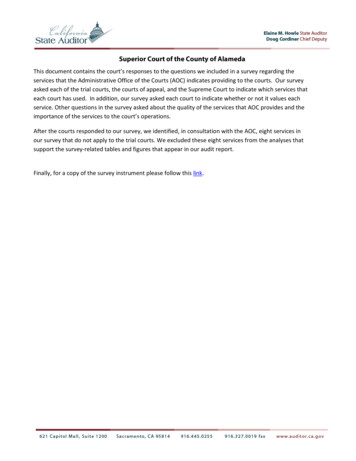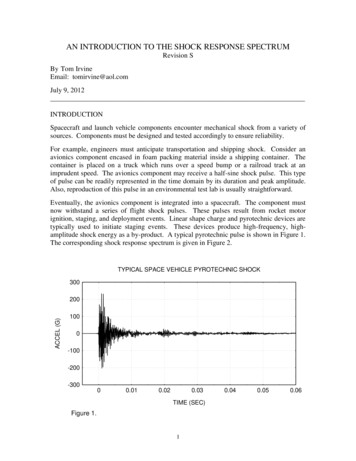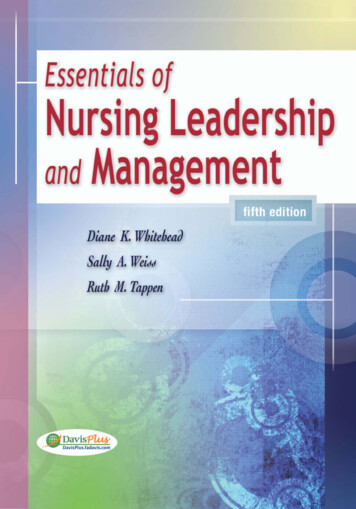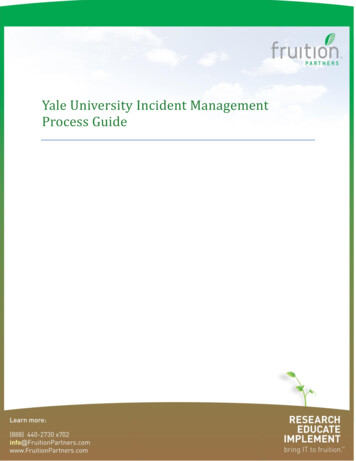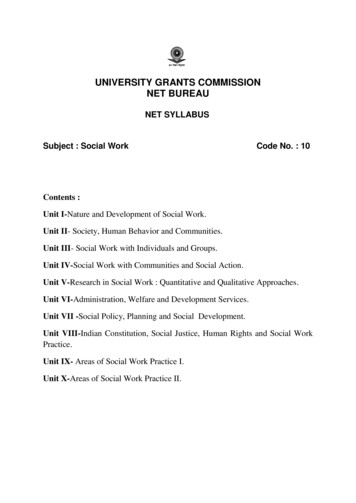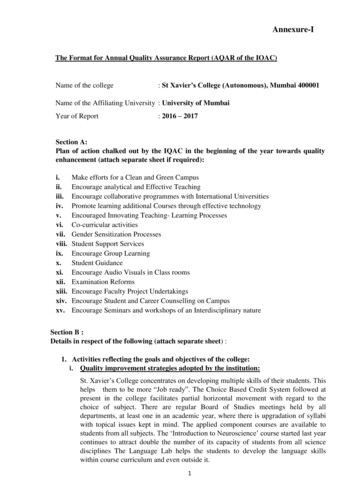
Transcription
Annexure-IThe Format for Annual Quality Assurance Report (AQAR of the IOAC)Name of the college: St Xavier’s College (Autonomous), Mumbai 400001Name of the Affiliating University : University of MumbaiYear of Report: 2016 – 2017Section A:Plan of action chalked out by the IQAC in the beginning of the year towards qualityenhancement (attach separate sheet if ii.xiv.xv.Make efforts for a Clean and Green CampusEncourage analytical and Effective TeachingEncourage collaborative programmes with International UniversitiesPromote learning additional Courses through effective technologyEncouraged Innovating Teaching- Learning ProcessesCo-curricular activitiesGender Sensitization ProcessesStudent Support ServicesEncourage Group LearningStudent GuidanceEncourage Audio Visuals in Class roomsExamination ReformsEncourage Faculty Project UndertakingsEncourage Student and Career Counselling on CampusEncourage Seminars and workshops of an Interdisciplinary natureSection B :Details in respect of the following (attach separate sheet) :1. Activities reflecting the goals and objectives of the college:i. Quality improvement strategies adopted by the institution:St. Xavier’s College concentrates on developing multiple skills of their students. Thishelps them to be more “Job ready”. The Choice Based Credit System followed atpresent in the college facilitates partial horizontal movement with regard to thechoice of subject. There are regular Board of Studies meetings held by alldepartments, at least one in an academic year, where there is upgradation of syllabiwith topical issues kept in mind. The applied component courses are available tostudents from all subjects. The ‘Introduction to Neuroscience’ course started last yearcontinues to attract double the number of its capacity of students from all sciencedisciplines The Language Lab helps the students to develop the language skillswithin course curriculum and even outside it.1
ii. Teaching and Learning:Peer learning is promoted within and outside the class hours. Team learning isfacilitated through project work, on-the-spot study, and educational forums. ICTenabled teaching-learning process has made students participate actively in theclassroom. Meaningful learning is initiated through guided teaching and guidedlibrary assignments, group discussion, seminars, debates, quiz, viva, etc. Inquiry–based learning is provided through community surveys, opinion polls, case studies,industrial visits and fieldwork. Teaching is at times using “media aids” and there islearning by social networking between the teacher and learner.iii. Examination system:Semester system with 2 Continuous Internal Assessments (CIAs) and an End semesterExamination is followed. The Principal, the Heads of Departments and Facultymonitor the performance of the students by making an analysis periodically afterCIAs and End Semester Exams. Moderation is done for all the Courses at the Firstand Second year level. The performance of students is analyzed at the AcademicCouncil meeting held twice a year. All the presentation and assignments are evaluatedby Grid sheets which enables students to get a feedback and insure impartiality.iv. Research and Development:Research is a significant activity of the college. During this academic year, researchpapers were published in National Journals. Several papers were presented in NationalSeminars and Conferences. 3 Research scholars have obtained their Ph. D. from theresearch centers of our college. 1 Major Research project and 11 minor projects weresanctioned by various funding agencies. Teachers have participated in OrientationProgrammes (4) and Refresher Courses (5). Institutional seminars and workshops areorganized regularly to provide skills and enhancement of teaching strategies. LearningAids are developed for the Visually Challenged.v. Infrastructure:The Library is central to all the academic activities of the college. It provides a placein which to study, material for study and services to assist study. With a computerizeddatabase of the books in the Library, the search and retrieval of books is easy. TheReference Library includes reserve counters, overnight loans, photocopying service,reference services, inter-library loans, journals and reference books and a specialmultimedia facility for accessing CDs and computers. We have also peer learningcubicles. The lending library houses Web-OPAC for information search, paperbacklibrary and a print and non print media library. The college is a subscriber of N-LISTfacility through which e-journals and e-books are made available to the facultymembers, researchers and senior PG students. ICT is available in all the classroomswith AV facilities. The Staff Room has been extended to provide extra space which isoften used by staff for Group Discussions with students.2
vi. Human Resource Management:There are regular Seminar conducted for the “Young teachers” as well as the entireteachingfaculty. The non-teaching faculty also are addressed. The TeachingAssessment Questionnaire (T.A.Q.) is conducted, analyzed and discussed with theteachers. Faculty is encouraged to participate and present research papers. Teachersare hired on ad hoc basis. Students are mentored by faculty.vii. Industry Interaction and Collaboration:Various Industries sponsor department festivals. They are also some renownedprofessionals assisting in formulating the syllabi for various departments. The Boardof Studies of every department has at least one representative from the relevantindustry. Students are encouraged to take up an Internship during their summer break,mostly first year going to second year students. The faculty help them to get thisexposure by recommending their students to various companies and organizations.This internship experience is mentioned in their consolidated marksheet at the end ofthe third year. Several departments organize Field Trips and Industrial Visits e.g.,Economics, Ancient Indian Culture, Political Science, etc where students get a handson experience. The Quest for Excellence Programme often invites Industry personnelto share their expertise of the subject. The Social Involvement Programme hascollaborated with several NGOs. The Xavier’s Center for Visually Challenged(XRCVC) is engaged in several CSR activities.viii. Contribution to environmental awareness / protection:Environmental studies a very vital subject in our syllabus St. Xavier’s College hasgone a step further by putting that theory into practice. Three sets of solar panels havebeen installed in our campus, providing electricity to lecture rooms, the Referencelibrary and the Hall. It is interconnected with the Brihanmumbai Electricity Supplyand Transport (BEST) line, which supplements the solar plant when necessary. Mostof the light fixtures in the campus have been replaced by CFL bulbs. A vermiculturepit for raw vegetable waste and bio- composing plant for kitchen waste, a bore wellfor non- potable water for the use in toilets and gardens to reduce consumption ofmunicipal potable water, rain water harvesting to replenish and improve the quality ofthe well water, opting for electronic chokes and CFL bulbs and the segregation ofwaste into recyclable and non- recyclable are the other ways in which St. Xavier’sattempts to create a clean – green atmosphere in the college. A strongrecommendation of using recyclable items is implemented to an extent in our canteenservices. Waste paper disposal is outsourced to an NGO that returns it in the form ofrecycled paper as well as awards Green Points. Sinagaes have been introduced instrategic positions in our campus to reduce paper usage for notices andannouncements. A Conservation lab was inaugurated in the Heras Institute.3
1.New Academic Programmes initiated (UG and R):a.Existing ProgrammesLevel of theProgrammePhDPGUGPG DiplomaAdvanced aryInnovativeCoursePhDPGUG (Aided)UG Self FinancingPG DiplomaDiplomaCertificateb.2.Number ofNumber ofprogrammesexistingadded during theProgrammesyear6733242542Number ofself-financingprogrammes2332414-Number of valueadded / ny, Chemistry, Geology, Zoology, History, Ancient IndianCulture.Botany, Life Science, Microbiology, Geology, Ancient IndianCulture, Biotechnology, Public Policy.Ancient Indian Culture, Anthropology, Commerce, Economics,English, French, Hindi, History, Political Science, Psychology,Sociology, Statistics, Botany, Chemistry, Geology, Life Science andBiochemistry, Mathematics, Microbiology, Physics, Zoology,Vocational (Software Development), Vocational (Tourism).Management Studies, Mass Media and Information Technology.Counselling Psychology, Data Science, Clinical Research.Forensic Science and Criminal Law, Gemmology.Practical Gem Appreciation and Identification, Forensic Science,Ancient Indian History, Culture and Archaeology, Intensive EnglishLanguage CourseInnovative Program: The B.Voc. (Tourism) and B.Voc. (Software Development)courses are skill /career oriented.Innovations in curricular design and transaction:ICT-enabled teaching-learning methods were adopted. Student-centered teachingstrategies were introduced. Purchase of Student Response Devices (Clickers), OpticalMark Recognition (OMR). High speed Sheet-feeder Scanners and OMR software. Nearlyall classrooms have projectors and screens audio visual facilities. Internet accessavailable through I/O box in each classroom.4
The use of the iPad in the Classroom enables the following:i. Show (on the big screen)ii. Manage (the classroom)iii. Assess (student work)iv. Interact (with students)v. Access (your files)vi. Make (instructional media)Innovative methods include experiential learning like field visits, industry visits, project andresearch based learning, market surveys, group discussions, workshops, case studies, Flipclassroom, e-learning, experiential learning, Peer Learning and Inquiry based learningfaculty. is adopted by several departments. The Continuous Internal Assessment encouragesstudents to use group and individual soft skills for presentations, open book tests.3. Inter-Disciplinary programmes started:Courses conducted under the Quest for Excellence Programme (QEP) and those by theDepartment for Inter-Religious Studies (DIRS) qualify as Inter-Disciplinary ones4. Examination Reforms implemented:i. Informative Assessments Methodologies: use of clickers, peer evaluation, MCQsii. Summative Assessment Methodologies:a) Question Paper Template designed for each course in tune with the learningobjectives of Bloom’s Taxonomy, prepared during the design of the syllabusb) Grids: Objective assessment, Embedding soft skills in core courses, Feed forwardand feedback mechanismc) Optical Mark Recognition for assessment of MCQs.d) Group Assessments: to foster Group dynamics especially for project assessmente) Poster and Oral Presentations of projects undertaken during the semesterf) The End Semester Assessment is in the form of a two hour comprehensive written/Computer based examination for each course held at the end of the semester.g) Quality Mechanisms for End Semester Examination:o Masking of Answer Paperso Centralised Assessment of Paperso Moderation of Assessment through External Examinerso Double blind Evaluation for Third Year courseso Feedback to Students – display of paperso Photocopy of Answer papers/challenge evaluationh) Progress made in Marking system / Grading System/ Relative Grading System.The college has adopted a 4 Point Grade System and provides students with theGrade point of each course, the Semester Grade point Average (SGPA) and theCumulative Grade Point Average (CGPA). The College also awards the first threestudents in each Course Combination at the end of the three years on graduationand provides certification of the student’s rank in the group.5
i) Introduction of Credit-Based Semester System / Choice-Based Credit System:i. Students of the Arts, Science and Commerce Faculty have to earn a total of150 credits for the undergraduate degree programii. 146 Academic Credits have to be earned. Credits are assigned based on thedepth of the Teaching -Learning process of each course; 1 Credit 30 Hours ofcontact and studyiii. Academic credits include credits for four newly introduced special courses of3 credits each: Interdisciplinary Environmental Studies, Giving Voice toValues, Human Rights & Cross Faculty Courseiv. Students have to complete Additional 4 Mandatory credits, grades of whichare not included in the GPA: Social Involvement Program (2 credits),Extracurricular Activities (2 credits) – Both programs are faculty monitoredand have to be completed over the six semesters.v. Second Year B.Sc. students have two 1 credit courses, one in each semester onScientific Communication Skillsvi. Students complete a summer internship related to their major subject duringthe summer between the SY and TY. This is optional but highly encouragedand students earn 1 credit for this activity.vii. Some credit courses are choice based e.g. Cross Faculty Course and AppliedComponent Courses.viii.There was a new system introduced for Students with Disabilities (SWD).Their special needs for learning and examination was considered and severalstrategies were tried to ensure that the SWD were comfortable which rangedfrom the help of faculty and peers for the study material as well asinfrastructure for the formal examinations.ix. In cases where one of the CIA was missed by the student there was no Retest.The student had to appear for a Supplementary Examination of 100 marks and3 hour duration a semester later by forfeiture of the CIA marks.x. The attendance of the students is recorded course wise and a minimum of 75%per course is required for the student to be eligible to appear for the EndSemester Examination. This data is documented in the Semester Marksheet aswell.xi. Credit Based Semester system –Postgraduate students have to earn a total of96 academic credits for the graduate program5. Candidates qualified. NET/&ET/GATE etc:NET / SET / SLET: 6GATE: 2CAT 4:IAS/IPS etc: 4State PSC & UPSC 1Others 66
6. Initiative towards faculty development programmeFaculty / Staff Development ProgrammesNumber of facultybenefittedRefresher Courses5UGC – Faculty Improvement Programme4HRD Programmes-Orientation Programmes4Faculty exchange Programme-Staff training conducted by the university8Staff training conducted by other institutions30Summer / Winter schools, Workshops, etc.Others : College Orientation to new teachersCollege Seminars / Workshops311187. Total number of seminars/workshops conducted: 5 such programmes were held:Themes / Details: Institutional level:i. On 20th July 2017: A Seminar of two sessions, on Skills for creating a ‘Lean ForwardClass’ followed by Jesuit Ethos for our ‘young teachers’.ii. 16th September 2016: also for our young teachers was Strategies for optimizingSurvival - with special reference to classroom and teaching .iii. On 10th August 2016: A Google Drive Workshop was organized to the entire faculty.iv. On 4th October 2016: a half day Seminar for the entire faculty on Take a Break beforethe Busy-you Breaks.v. On 10th March 2017: A day-long seminar ‘Adapting to Change’ was held for the entirefaculty. This included 3 sessions to sensitize us to the need for ‘Inclusive Education’. Thefirst one was on Building Inclusion – The Disability Perspective, the second one onMentoring the Digital Natives and the third session on What the student needs?7
8.Research projects a) Ongoing; b) CompletedNature of theProjectDurationIn YearTotal grantSanctionedReceived(Rs)Name ofDept.Name of ProfessorMajor Project3UGC12,30,0007,30,000EconomicsDr Aditi SawantMinor Project2UGC3,47,0002,07,000MicrobiologyMs Sangeeta ChavanMinor Project2UGC2,82,0001,69,000MicrobiologyMs Karuna GokaranMinor Project2UGC2,70,0001,55,000 BiotechnologyMs Norine D’SouzaMinor Project2UGC4,80,000----Life ScienceDr Priya SundarrajanMinor Project2UGC4,18,000-----Life ScienceDr Seema DasMinor Project2UGC2,05,000----ChemistryMr Marazban KotwalIndustrySponsored1Sir DorabTata Trust120000Life ScienceDr Priya Sundarrajan28,000GeologyDr GaoutamBandhophadhaya28,00025,000GeologyDr Bobby Matthew25,00032,000ChemistryDr Ashma Aggarwal25,000ChemistryDr Pralhad RegeMumbai1Projectssponsored by er thancompulsory bythe University)Anyother(Specify)9.Name ts generated, if any:Type of edNil8
10.New collaborative research programmes: None11.Research grants received from various agencies: Rs.9,32,530/-12. Details of research scholars:There are 9 PhD guides from different disciplines and 15 students are registered for theDoctoral programme. 4 faculty are on the FIP to complete their PhD.13.Citation index of faulty members and impact factor: Impact factor - 0.325 to 4.014.Honours/Awards to the faculty: National and International: Nil15.Internal resources generated:16.Details of departments getting assistance / recognition under SAP, DSST (ASSST) /DST FIST and other programmes:No17.Community services:i.NoSt Xavier’s College provides students with learning opportunities that extend beyond theclass room and the campus. The Social Improvement programme (S.I.P.) has been a keycomponent of such a learning process. The SIP primarily aims at contributing to holisticfocus.ii. The Xavier’s Research Center for Visually Challenged – XRCV, is an enabling unit oncampus at St Xavier’s College (Autonomous), Mumbai. The primary aim is to transformlives both at the micro and macro levels. Along with providing direct and indirectsupport to visually impaired persons at the micro level, XRCVC also works closely withgovernment agencies, corporates, researchers and educational institutions on advocacyand sensitisation initiatives at the macro level.iii. The Social Service Programme (SSL) and the All India Catholic University Federation(AICUF) conduct various outreach activities where students participate voluntarily.Project Care, various outstation camps and Blood Donation drives are organizedperiodically by the SSLiv. Several departments engage in activities that involve communities that are at adisadvantage.18.Teachers and officers newly recruited: None19.Teaching to Non-Teaching Staff ratio:9122:139
20.Improvements in the library services:Existing Till 2015-16No.Text lDatabaseCd & VideoNewly Added es(8566)N-LIST(INFLIBNET)492 (Alongwith books)TotalNo.Value971204109189019 alongwithbooks295000Approx511Others(Specify)21.New books/ journals subscribed and their value: Rs. 4,50,000/- Approx.Please refer to the above question.22.Courses in which Student assessment of teachers is introduced and the action takenon student feedback:Every semester TAQs are conducted for all the new teaching faculty for the coursesthatthey teach. Every academic year TAQs are administered for faculty of one entire stream.The results of the TAQ are discussed with the new faculty by the Head of the Departmentand the Vice Principal. Wherever necessary guidance is given for improvement.23.Feedback from Stakeholders: Positive24.Unit cost of Education: As per the Fees charged for aided and unaided courses25.Computerization of administration and the process of admissions and examinationresults, issue of certificates:i. Syllabii on the web siteii. All notices and announcements go on the website.iii. Parents Login for checking the attendance of their childreniv. Examination Schedules, Seating Arrangements and other details of examinations on thewebsite.v. N-list online SLIM software for library. The online library catalogues helps us to searchthe books availability.vi. A live broadcasting of Graduation ceremony 2016 was taken charge of and organised bythe Knowledge Centre.10
26.Increase in the infrastructural facilities:FacilitiesExisting11749sq.mtrs.40Campus areaClass roomsNewlycreatedSourceofFundTotal--11,749 sq.mtrs.--40Laboratories17--17Seminar Halls3--3-33UGC33-20.52UGC20.52----No. of important equipmentspurchased ( 1-0 lakh) duringthe current year.Value of the equipmentpurchased during the year (Rs.in ComputerCentersOfficeDepartmentsOthersTechnology upgradation:TotalComputers27.Existing349545 Mbps1152319Added55-------Total404545 Mbps1152319Computer and internet access and training to teachers non-teaching staff andstudents:1) Knowledge centre organized live broadcasting of Graduation ceremony of the 2015-16students.Thursday 16th June, 2016:B.Com., BMS, BMM and BSc. I.T.Friday 17th June, 2016:Science StreamSaturday 18th June, 2016:Arts Stream2) Set up of CCTV cameras with networking in college campus.3) 15 Classrooms are digitally upgraded with ultra short throw projectors and slidingceramic white projection boards.11
4) Knowledge centre facilitated the introduction of free Wi-fi services in the college byintroducing Joister. Students can avail Joispot unlimited free Wi-fi at 2 Mbps speed from6 access points but restricted to the ground floor of the campus. Totally 18 Wifi accesspoint are deployed and configured by XKC in departments.5) (Chemistry, Physics lab, Heras, BMM - 2, Malhar - 2, BVoc, Mathematics, Botany,Sociology 2, XRCVC, Board Room, Zoology, VP junior, MPP)6) Tie- up with Band. Band is Teams / Clubs - Post notices, schedule meetings, and chatwith all members in a group. Helpful for students and staff for interaction.7) Deployment of five digital signage TV in campus and run through the software andmaintenance of 8 digital signage.8) Renewal of campus subscription for Turnitin with iGroup Infotech India Pvt. Ltd.9) Creating login credentials (NLIST) for students and staff. (Online e-library)Arranged lab facilities for following workshops & events:No.Topics/ SubjectDate / MonthNo 632MendleyPlacement cell08.08.201660Firewall SettingPsychology24.08.20165Internet settingBSCIT (Honors)26.09.201625Python(Windows)French4.11.2016 To6.11.201630Basic software38Moodle30Rasmol, Bioedit13Office 2010,BrowserOrganized by1.Experimental Psychology2.Deloitte - Placement Hiring online test3.Psychology Quiz Competition4.Python Program5.Indian Association of Teachers of FrenchCongress6.Diploma in Forensic Science& CriminalLawForensic Science7.Bioinformatics Workshop (Palindrome)Biotechnology15.12.20168.Diploma in Clinical ResearchClinical al PsychologyPsychology9.01.201731Coglab10.Axis Bank - Placement Hiring online testPlacement Cell23.01.201740Internet11.Post Graduation Diploma in Data ScienceStatisticsEvery Saturday& Sunday30R software, Rstudio12.Commerce ClassesCommerceEvery Fridayevening90Basic Software1203.10.20169.01.201710.01.2017
Video Conference arranged:Sr. No.ParticularsDateDepartmentLocation1.Mohanan, IISER, PuneJune, 2016PhysicsPhysics Lab2.French CongressNov, 2016FrenchVC Lab3.Scholarship Opportunity for Xavier’sstudentsApril, 2016Jr. CollegeVC Lab29.30.Financial aid to Students:Number of studentsAmount (Rs)Financial support from institution1304,51,005Financial support from government1201,94,051Financial support from other sources1002,92,500Number of students who receivedInternational/ National recognitions--Activities and support from the Alumni Association:i. There is an Alumni Association which is in existence since 1902ii. An Executive Committee is in place.iii. The Xavier’s Development Programme maintains a record of all the alumni31.Activities and support from the Parent-Teacher Association:In order to communicate to parents the areas their children are excelling in and theacademic progress their children have made, Parent-Teacher Meetings are held. For the FYstudents after the admissions are finalized and before the regular classes begin there is anOrientation organized for the parents and students and between the two semesters parentsof all the undergraduate students are invited for a meeting to meet the faculty and check ontheir wards’ progress.32.Health services:An equipped Rest Room within the campus is available for emergencies. A doctor can alsobe contacted readily whenever there is a need.33.Performance in Sports activities:State / University level:186National level:015International level:001No. of medals /awards won by students in Sports, Games and other eventsState/ University level:048National level:003International level:00013
34.Incentives to outstanding sports persons:There is a dedicated function annually to felicitate the team members. Deservingsportspersons are honoured by awarding scholarships.35.Student achievements and awards:Sports:State/ University level:048National level:003International level:00036.Activities of the Guidance and Counselling unit:i.ii.iii.iv.v.37.Staff consists of two counselors, one full time and one part-time. Additional staff helpsout for the two summer vacation months because of the rush. Most of the counsellingdone is psychometric testing followed by vocational and career guidance based on thetest results. This is done for students of Std. X and above.A fair amount of personal counselling is also done. The clientele is mostly fromXavier’s College but a large number come from other colleges and elsewhere.Orientation talks are given to FYJC students and their parents.Orientation talks and sessions in refresher courses for School and College students andteachers in Mumbai University.About 2000 students come for career guidance, about 500 for personal counseling andabout 600 for Orientation talks and Refresher Courses.Placement services provided to Students:On campus38.Off CampusNumber ofOrganizationsVisitedNumber ofStudentsParticipatedNumber ofStudentsPlacedNumber of StudentsPlaced56382957Development programmes for non-teaching staff:HRD programmes were held for the support staff. A Staff Picnic is conducted every year.There are two Seminars or Workshops every year for the Faculty, with external resources,often at the College Human Resource Centre in Khandala, outside the city. Facultymembers also participate in Seminars and Conferences in other institutions. Theinternational exposure that about half of the Faculty have had, also seeks to enhanceprofessional competence and motivation. The Non-Teaching Staff have a yearly Seminarfor personal enrichment and professional development. More important are the welfaremeasures on their behalf, which seek to keep them motivated and fulfilled. The ITdepartment organized a special workshop for the non teaching staff to impart basicknowledge about various softwares including Microsoft Word and Excel, teaching thememail and various other options available online.14
39.Good Practices of the institution:i.Honours Programme / Quest for Excellence Programme: The number ofparticipating departments and students increased which provides a challenge to thestudents to gain more knowledge and understanding besides their mainstreamlectures. This promotes Inter Disciplinary academic activity in the Campus.ii.TAQ: Encourages positive change in the teachers and guides them for the betteriii.The Special courses introduced by St Xavier’s College: A.SPC.1.01 (SpecialCourse: Environmental Studies), A.EES.1.01 (Critical Reading Thinking & Writing:Prose) A.SPC.2.01 (Special Course: Giving Voice to Values) A.EES.2.01 (CriticalReading, Thinking And Writing: Literature) and A.SPC.3.03- Human Rights. Someof these courses have initiated a hands on experience especially with focus onawareness of the Environment.iv.Language Lab. continues to help students to improve on their language skills.There are special courses organized for other groups (including foreign students).v.SIP continues to provide sensitization to social issues to our students.vi.Scientific Communication Skills conducted in Semesters III and IV for Sciencestudents provides them with the introduction to a research culturevii.Cross Faculty Courses: All the departments offer this innovative course to exposestudents to an introductory level of the subject which is very well received.viii. The Examination pattern has been modified. There is no Retest for CIA in lieu ofwhich the student will be appearing for a Supplementary Examination of 100 marksand 3 hour duration.ix.The attendance of the students is recorded course wise and a minimum of 75% percourse is required for the student to be eligible to appear for the End SemesterExamination. This data is documented in the Semester Marksheet as well.40. Linkages developed with National/ International, academic / research bodies:i. International Academic Links: Currently Xavier's has 28MOUs signed withuniversities spanning all five continents.ii. Several faculty members are regularly invited as Resource persons to variousinstitutes and programmes.iii. There is active consultancy opportunities by the Departments of Botany andGeology.iv. There are collaborative events between the Museum and the Department of AncientIndian Culture15
41. Action Taken Report on the AQAR of the previous year:i.To sustain an eco-friendly campus we have three set of Solar panels was installed.There is segregation of Dry and Wet garbage on Campus. The canteen is usingrecyclable item for service. Sinages at strategic position in the campus have reducedpaper consumption for announcements and notices. The Social Service League attemptedan E-waste drive .ii.For faculty development, 4 New Teachers’ Seminars and 3 Faculty Seminars were held.Regular Teaching Assessment Questionnaires (T.A.Q.) were conducted and discussedwith the professors. Proper guidance was provided for th
cubicles. The lending library houses Web-OPAC for information search, paperback library and a print and non print media library. The college is a subscriber of N-LIST facility through which e-journals and e-books are made available to the faculty members, researchers and s




